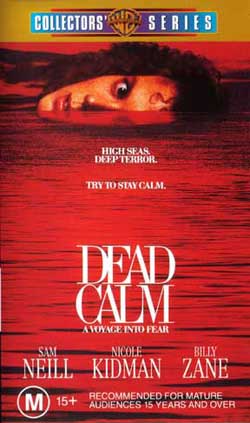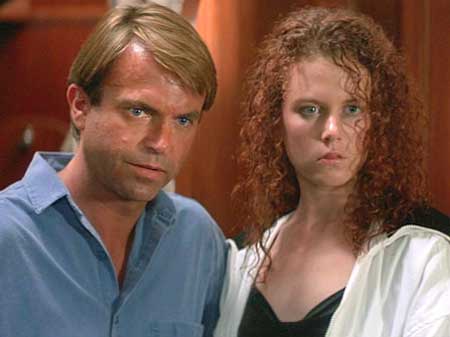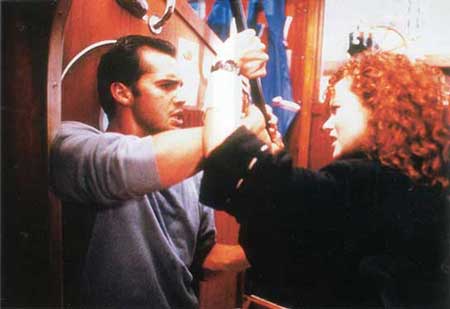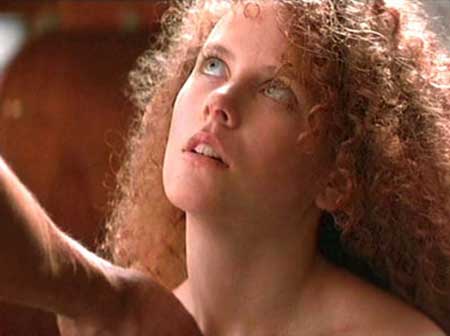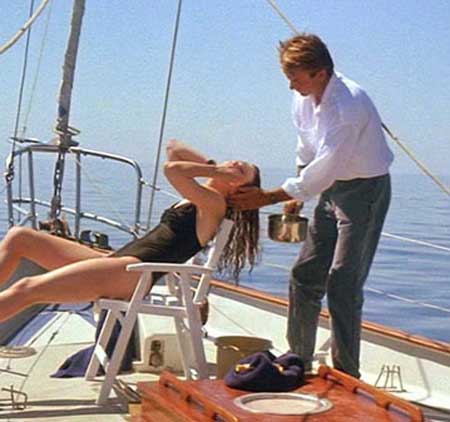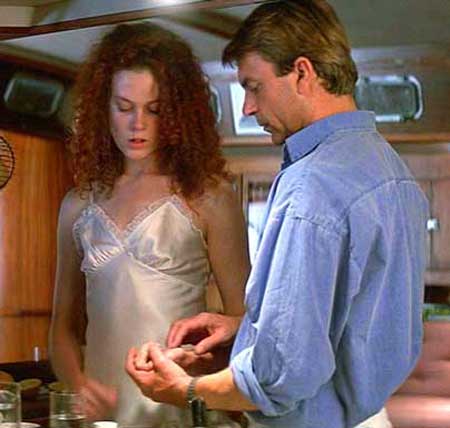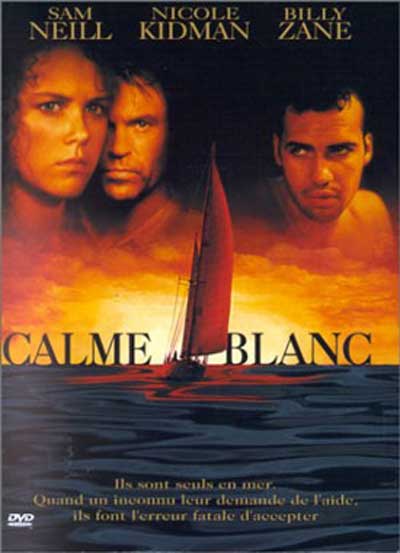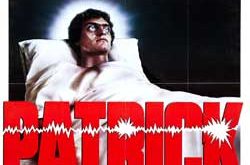SYNOPSIS:
A mass-murderer kidnaps and seduces a young woman after leaving her husband to die on the vessel whose crew he’s just slaughtered.
REVIEW:
The title to this 1989 suspense/thriller from director Philip Noyce is fairly spot-on; Dead Calm is, in large part, a lot of floating at sea without much terror at all. Sure, there are ripples of horror, and the big storm hits towards the finale when things really get rocky, but for the most part Dead Calm is content with a slow, steady jaunt without much action.
Nicole Kidman and Sam Neill star as Rae and John Ingram, a couple who have recently lost their child in a terrible car accident and are trying to rebuild by taking a peaceful trip out to sea in their houseboat. It’s lucky that John is a sailor, because they meet a man named Hughie (Billy Zane) whose ship has started to sink, with six people aboard it dead of botulism. The turbulent beginning of the movie is quite shocking, and not just because it’s the first glimpse of Kidman’s bright red perm. The Ingrams’ son is thrown from the motor vehicle in spectacular, grisly show, and it at first seems as though Dead Calm is going to throw the audience right into the water for a sink-or-swim thriller.
However, as the film progresses, it’s apparent that the first scenes of Dead Calm are meant to spice up an otherwise bloated movie. One of the major problems in Dead Calm is the lack of character; the film might sustain a half-hour or hour television special quite well, but since the film is forced to hit the 90 minute mark, there’s just not enough suspense to fill all of it. What we get is a film that’s full of rocking boats and Nicole Kidman attempting to take her own boat back at all costs. Hughie hijacks the boat once he realizes John has left it to explore the other schooner, and Rae isn’t much help at all when she allows Hughie to easily seize the wheel and leave John on the sinking ship.
Since Noyce has set up the excellent opening to identify Rae, it would seem like her guilt in her son’s death would play a part in why she is so weak and reticent of killing Hughie. Not so – there’s no mention of the child’s death during the later portions of the film except for Rae’s antidepressant drugs, and even then they’re only used to poison. Instead, Dead Calm simply makes Rae out to be a rather weak, miniscule woman, a point that feminists might have contention with when watching the film. For most of the movie, while John does the backbreaking work of getting the other schooner working and sailable, Rae simply allows Hughie to do what he has to do, only attempting to thwart things when John asks. Even then, Rae is only minorly helpful – she takes the engine key out, throwing it into the water, only to have the dog retrieve it again. She’s even forced to sleep with Hughie (for what reason, it’s not entirely clear) until she tries unsuccessfully to blow his head off with a shotgun and then again with a harpoon gun.
Thankfully, Dead Calm does at least try to show Rae developing emotionally and physically as a character once she finally fights back at the end of the film, but by then it’s too late for the audience to really care – the film has portrayed Rae as weak for far too long, and our perceptions don’t change much once John has to swing into the rescue once more at the end of the film.There’s not much suspense within Dead Calm either. Hughie has his moments of insanity when pressed, but for the most part his character is left to his own devices without much to set him off. If Rae were pursued throughout the film, if she felt any sense of claustrophobia at being trapped within such a small boat with a monster, Dead Calm might provide a small sense of horror. But the scariest moments actually happen away from Rae and Hughie, when John has to fight his death of drowning.
Some might find the lead-up to the conclusion thrilling; this might just be because of Rae’s perceived weaknesses. In any event, the major problem with Dead Calm is the total lack of ability from Rae – she becomes someone to root against because of her lack of strength, and even when she does gain some power, it’s due to some chance bit of luck. The film is more frustrating than terrifying, and thought it might not sink, it’s certainly a film that does the dead man’s float.
Dead Calm (1989)
 Horror News | HNN Official Site | Horror Movies,Trailers, Reviews
Horror News | HNN Official Site | Horror Movies,Trailers, Reviews
